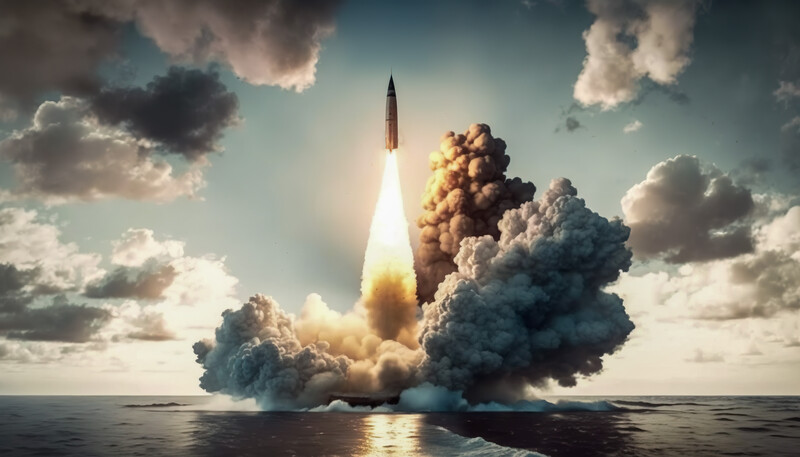A new nuclear arms race is accelerating, but Australia won’t be doing much about this threat to global survival. This week’s budget confirms the death of Labor’s nuclear disarmament diplomacy. Former diplomat Philip Dorling explains.
At his AUKUS submarine announcement on 14 March 2023, Prime Minister Anthony Albanese spoke of Australia’s “proud record of leadership” in nuclear non-proliferation. On 17 April Foreign Minister Penny Wong trumpeted Labor’s “proud history” of championing practical disarmament efforts”.
Labor does have a history of disarmament and non-proliferation leadership. In the 1990s Foreign Minister Gareth Evans was an outstanding diplomatic activist with Australia playing important roles in negotiation of the Chemical Weapons Convention, extension of the Nuclear Non-Proliferation Treaty, and the Comprehensive Nuclear Test Ban Treaty. Evans argued before the International Court of Justice that the use and threat of nuclear weapons is illegal. The Canberra Commission produced a landmark report charting steps to achieve the elimination of nuclear arsenals.
Dollars for diplomacy
Foreign Minister Wong is the latest custodian of Labor’s tradition of middle power disarmament diplomacy. But what are Labor’s priorities now? Well, at the end of the day, money talks and in Tuesday’s Federal Budget the Department of Foreign Affairs and Trade (DFAT) picked up an extra $74.6m for nuclear diplomacy.
Of that, $52.7m is for DFAT to provide “international policy advice and diplomatic support for the nuclear-powered submarine program.” Another $21.9m will go to the Australian Safeguards and Non-Proliferation Office (ASNO) to support the establishment of safeguard arrangements with the International Atomic Energy Agency (IAEA) for the AUKUS project.
All the new money is to support AUKUS.
AUKUS submarines “nation building” says Admiral. No they’re not, says Rex Patrick
AUKUS safeguards
For the AUKUS project to proceed within the framework of Australia’s non-proliferation obligations, Australia must negotiate a special arrangement with the IAEA to allow the use of highly enriched uranium in submarine reactors. We already have a Comprehensive Safeguards Agreement (CSA) with the IAEA that covers civilian nuclear activities. Article 14 of the CSA allows for negotiation of an arrangement with the IAEA to oversee the use of nuclear material for non-explosive military purposes, i.e. nuclear naval propulsion.
It’s challenging to combine the safeguards transparency with the secret world of nuclear submarines; but the Australian Government and IAEA Director General Rafael Grossi appear confident an arrangement can be agreed to enable the IAEA to provide credible assurances that submarine fuel is not being used to manufacture nuclear weapons.
The Government has already affirmed that Australia will be provided with complete, sealed reactor units from which the removal of any nuclear material would be extremely difficult. The reactor fuel will “not be in a form that can be directly used in nuclear weapons without further chemical reprocessing, requiring facilities that Australia does not have and will not seek”. Australia’s wider non-proliferation obligations, including acceptance of IAEA inspections anywhere, anytime will remain in place.
A few days before the 14 March AUKUS announcement, Albanese and Wong wrote to Grossi to open formal negotiations. ASNO Director General Geoff Shaw also forwarded “preliminary design information” to the IAEA.
Diplomatic dogfight
However despite what DFAT describes as Australia’s “impeccable non-proliferation credentials”, the negotiations are already politically contentious with China claiming AUKUS “poses serious nuclear proliferation risks”. Beijing alleges Australia is “coercing the IAEA Secretariat into endorsement on the safeguards issue”. Chinese diplomats are demanding an “intergovernmental process” involving all IAEA members with any new arrangement “jointly discussed and decided by the international community”.
Australia’s government doesn’t want AUKUS derailed. We’re relying on advice from the IAEA in 1978 that states an Article 14 arrangement can be negotiated with the IAEA Secretariat before being provided to the IAEA Board of Governors for “appropriate action”. Australia would like Grossi to simply submit the negotiated arrangement to the Board as information. However the Board may insist on subjecting the arrangement to its approval. China and Russia will demand that, and they’ll likely vote against any arrangement regardless of its terms. IAEA Board approval is by no means assured. Even if the Board does approve, China won’t leave the matter there. A fractious dispute could drag on for years.
That’s why $74.6m has been committed to AUKUS diplomacy. This large and complex campaign will involve negotiation with the IAEA Secretariat and engagement with the 35 countries on the IAEA Board, indeed with all 176 members. Australia will be funding plenty of IAEA projects, seminars and workshops. In terms of diplomatic effort it’s equivalent to running for election to a seat on the United Nations Security Council, only more controversial and already actively opposed by China and Russia.
All this comes with big opportunity costs.
A new nuclear arms race
The international situation is deeply worrying. Tension between China and the United States over Taiwan continues to rise. There’s already a naval arms race of which AUKUS is a small part, but the bigger strategic shift is manifest with China’s expansion of its nuclear forces. Construction of hundreds of new silos for a greatly expanded strategic missile force raises the prospect that Beijing is seeking an arsenal much closer to parity with the US.
At the same time, Russia has suspended the New START nuclear arms treaty which will expire in 2026. Moscow’s development of new and potentially destabilising delivery systems makes the future strategic calculus more uncertain. In turn, the prospect of three way nuclear arms competition with China and Russia has led to calls in the US Congress for an expansion of US nuclear forces.
Australian diplomats express concern about “the opaque nuclear arsenal build up in our region”. Others are less coy about the nuclear danger. Veteran foreign policy analyst Professor Joseph Siracusa recently warned that “We are literally on the eve of destruction …
The return of superpower arms control negotiations is the only alternative. … Otherwise, we’re finished.”
The demise of Labor’s disarmament diplomacy
Labor’s national platform commits the government to move to join the Treaty on the Prohibition of Nuclear Weapons (TPNW), a recent agreement produced under UN auspices to advance nuclear disarmament. Albanese championed Labor’s 2018 commitment to sign the TPNW. In June last year a large group of former Australian Ambassadors and High Commissioners urged the new government to follow through and join the TPNW as demonstration of “a principled foreign policy … that advances the global common good”.
The United States has no enthusiasm for the TPNW and DFAT worried that the new Labor Government would be receptive to something that could complicate AUKUS, especially ensuring bipartisan support in the US Congress.
They needn’t have been concerned. Labor’s pledge to join the TPNW was a dead letter the moment Labor’s leadership signed up to the nuclear submarine project. DFAT submissions released under FOI show Wong agrees that TPNW isn’t a priority. She massaged Labor rank and file concerns by sending Labor backbencher Susan Templeman as an observer to the first TPNW states parties meeting in Vienna in June 2022. But as DFAT noted, “our attendance as an observer did not represent a decision to join the TPNW.”
Questioned in March by independent MP Zoe Daniel about the backflip, Albanese again referenced Labor’s “proud history” of disarmament efforts, but wouldn’t commit to joining the TRNW.
Lost opportunity
Australia could be working with TPNW countries to put an international spotlight on the dangers of a new nuclear arms race. Realistic and practical measures that could be pursued include those proposed by former ASNO Director General John Carlson; pressing nuclear weapon states for “no first use” commitments, a cap on existing arsenals, no modernisation or new weapons and a draw down towards minimum deterrence capabilities.
However with AUKUS dominating the agenda, there isn’t any room for the middle power diplomacy once practiced by Gareth Evans. Instead, Australian diplomats are busy defending our nuclear submarine pact. At a recent meeting in Geneva on nuclear risks, Australian spent nearly as much time and effort rebutting Chinese allegations about AUKUS as what was devoted to substantive issues.
The Government’s budget allocation to DFAT shows they know they have a long diplomatic fight on their hands. It will suck the life out of Australian disarmament diplomacy. We’ll be talking ad nauseam about AUKUS while a nuclear arms build-up makes the world much less safe.
Labor’s disarmament activism is dead, cannibalised by AUKUS.
Philip Dorling has some thirty years of experience of high-level political, public policy and media work, much of that at the Australian Parliament.
He has worked in the Australian political environment from most angles, in both the national and state levels of government including as a senior executive; as a senior policy adviser for the Federal Labor Opposition and for cross bench Senators; and as an award-winning journalist in the Federal Parliamentary Press Gallery.

